2013年中考英语复习_新目标七年级下册Unit 7 –Unit 12
文档属性
| 名称 | 2013年中考英语复习_新目标七年级下册Unit 7 –Unit 12 | 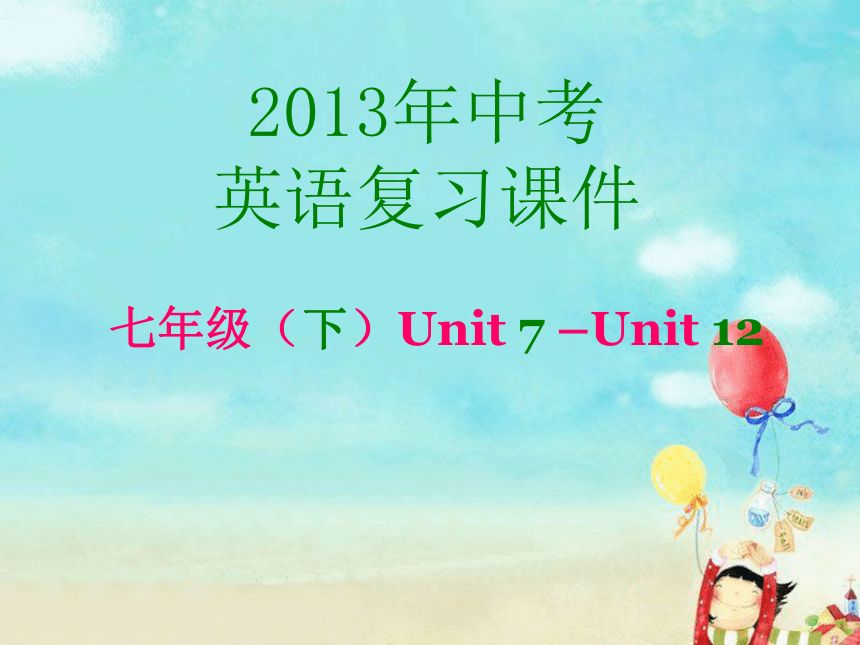 | |
| 格式 | zip | ||
| 文件大小 | 5.1MB | ||
| 资源类型 | 教案 | ||
| 版本资源 | 通用版 | ||
| 科目 | 英语 | ||
| 更新时间 | 2013-07-26 13:32:26 | ||
图片预览

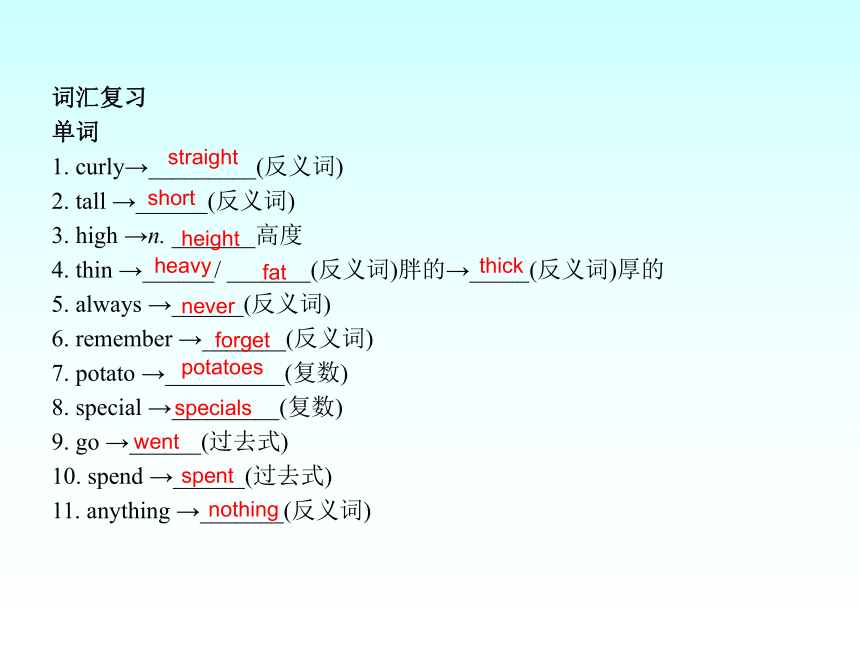
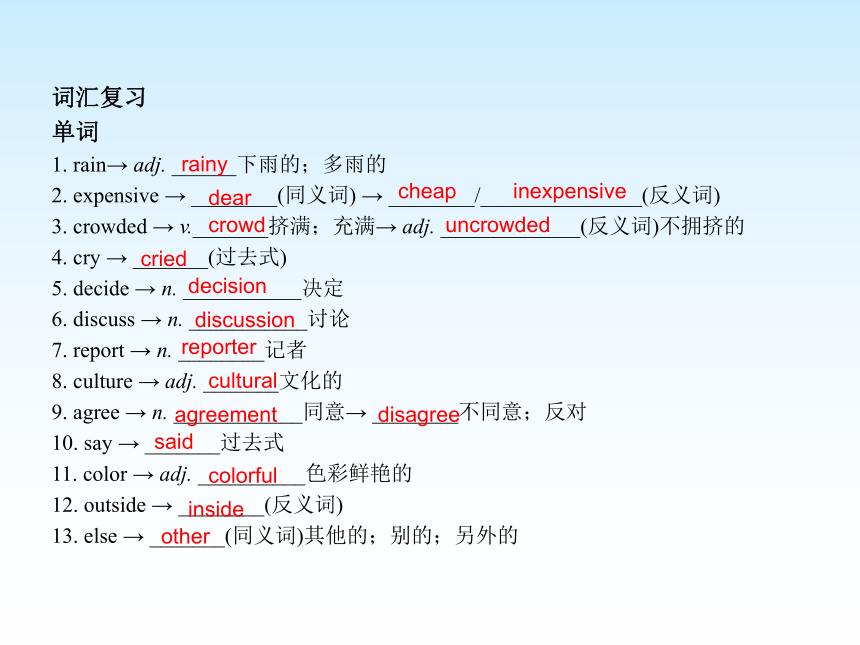
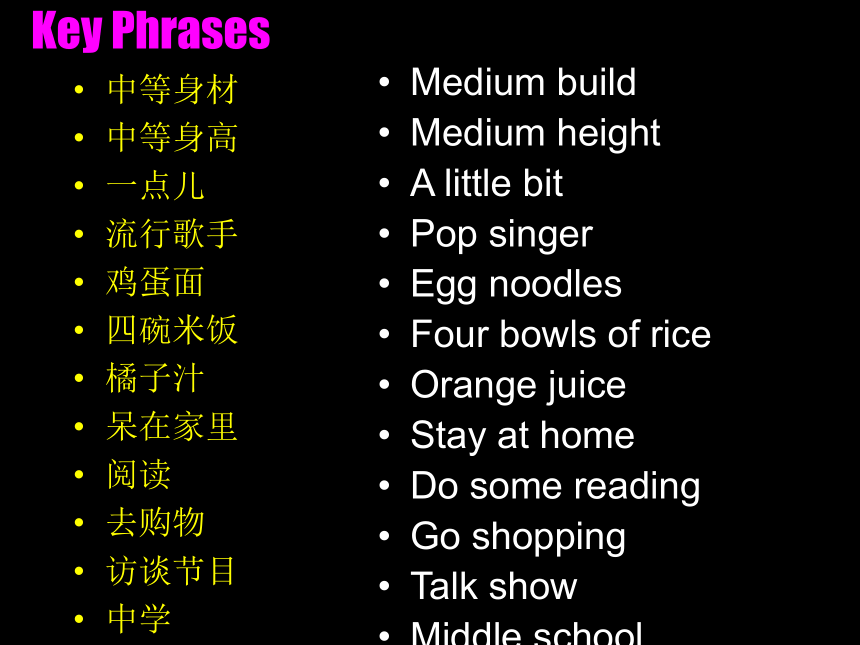
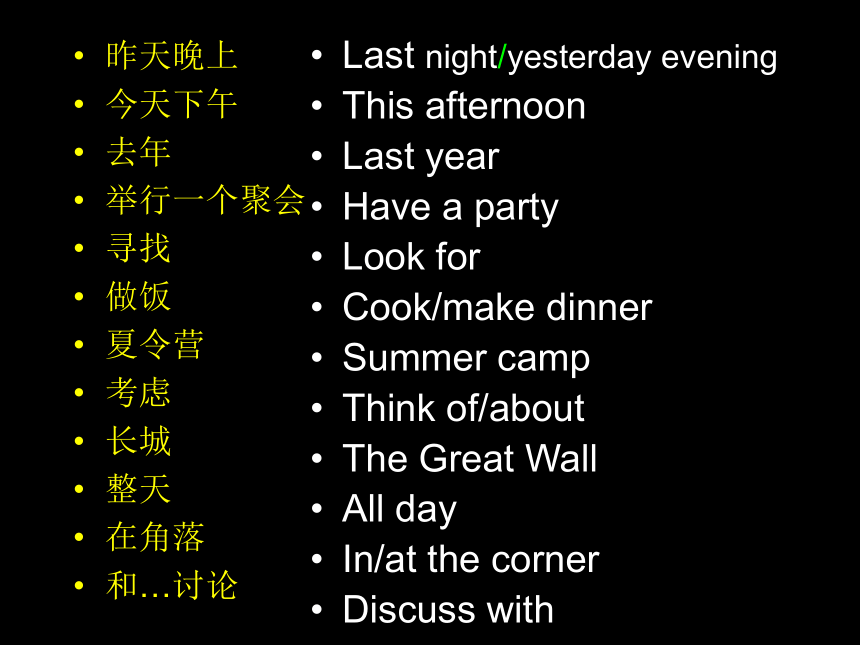
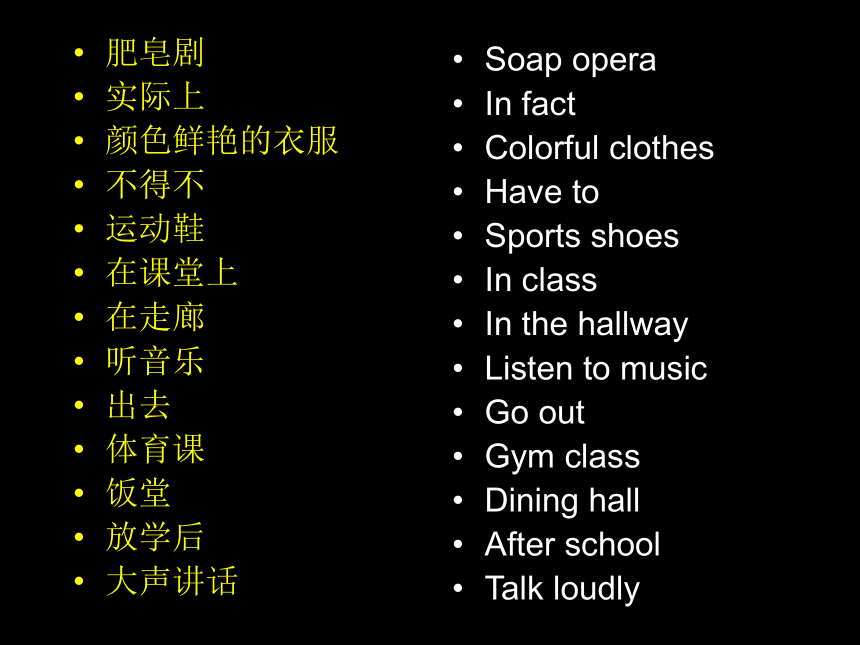
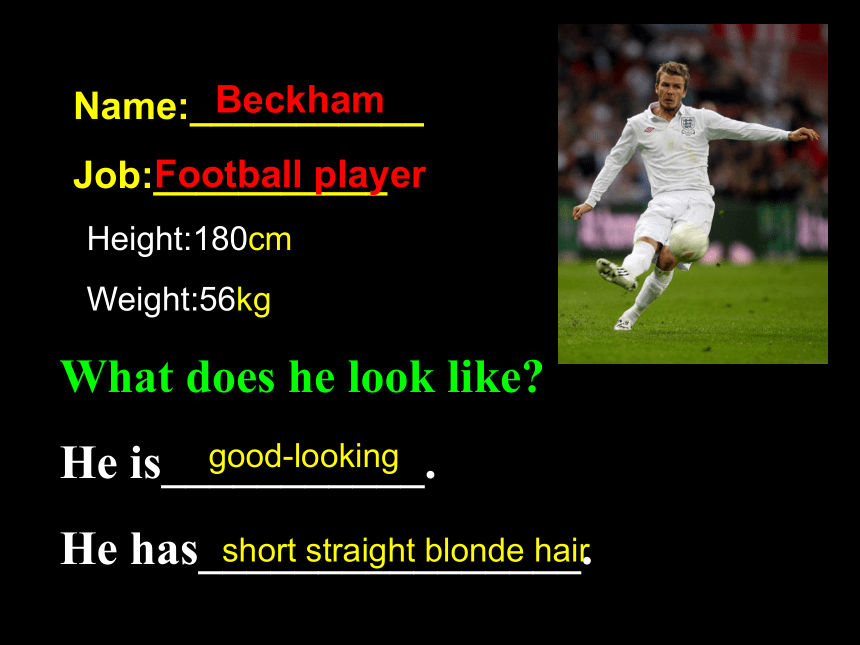
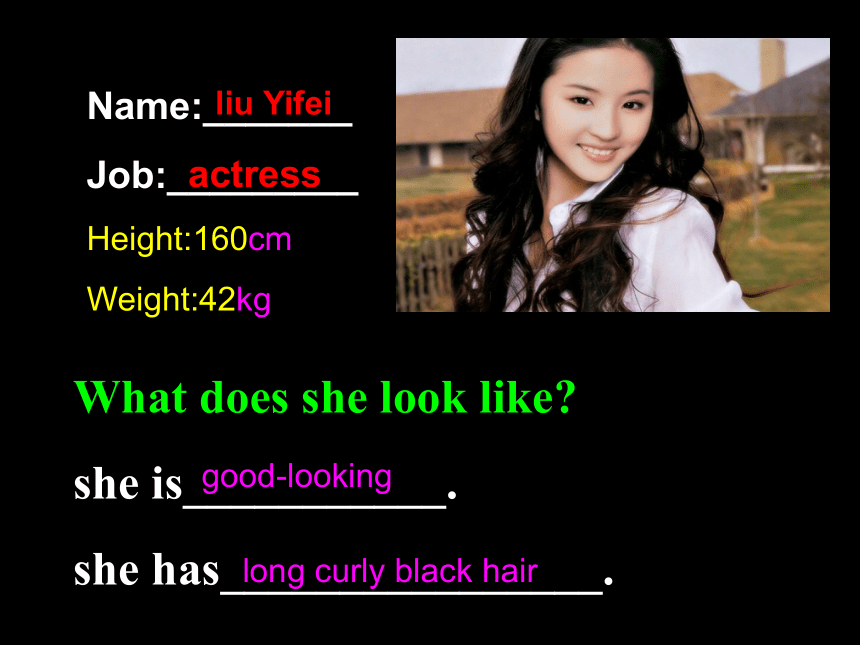
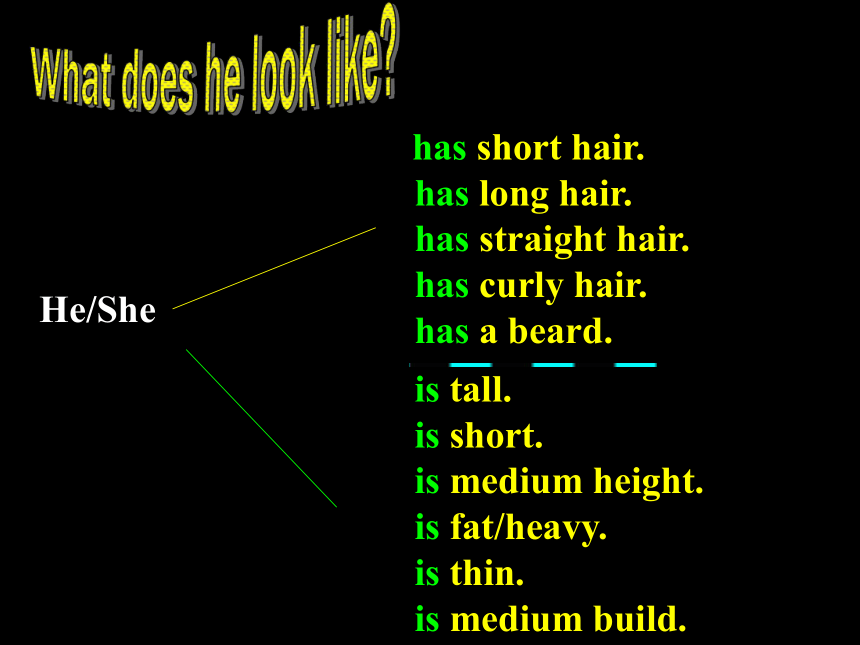
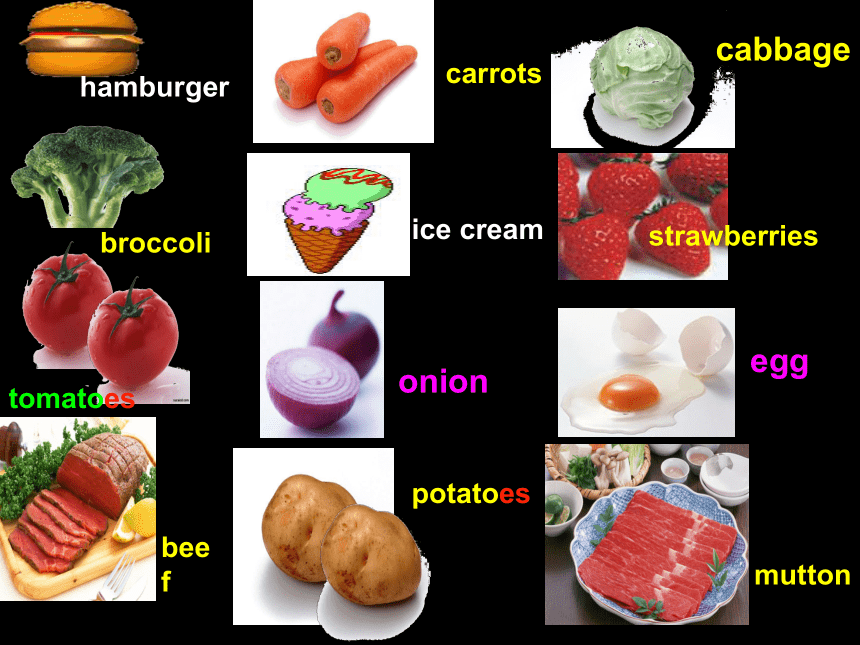
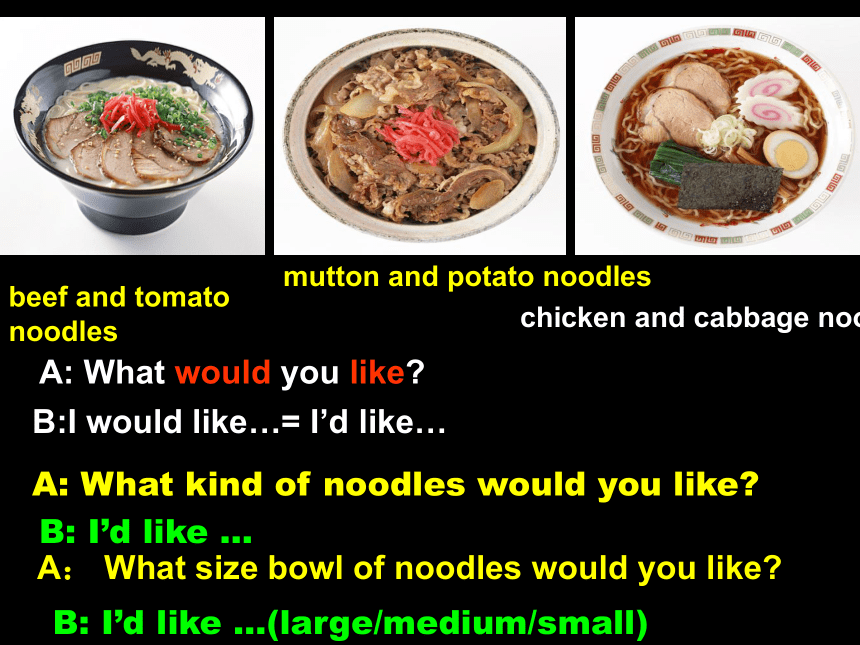
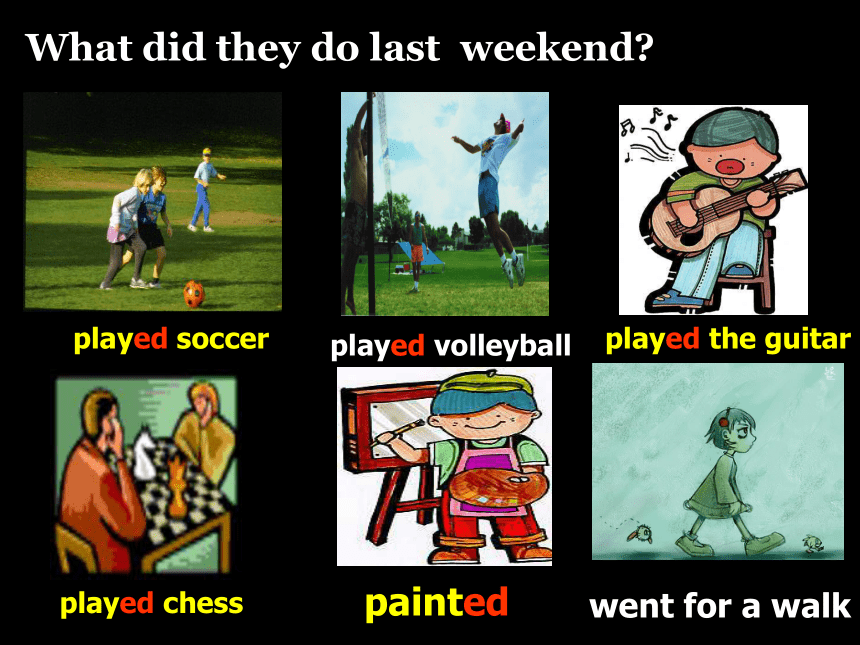
文档简介
课件38张PPT。2013年中考
英语复习课件七年级(下)Unit 7 –Unit 12词汇复习
单词
1. curly→_________(反义词)
2. tall →______(反义词)
3. high →n. _______高度
4. thin →______/ _______(反义词)胖的→_____(反义词)厚的
5. always →______(反义词)
6. remember →_______(反义词)
7. potato →__________(复数)
8. special →_________(复数)
9. go →______(过去式)
10. spend →______(过去式)
11. anything →_______(反义词)straightshortheightheavyfatthickneverforgetpotatoesspecialswentspentnothing词汇复习
单词
1. rain→ adj. ______下雨的;多雨的
2. expensive → ________(同义词) → ________/_______________(反义词)
3. crowded → v._______挤满;充满→ adj. _____________(反义词)不拥挤的
4. cry → _______(过去式)
5. decide → n. ___________决定
6. discuss → n. ___________讨论
7. report → n. ________记者
8. culture → adj. _______文化的
9. agree → n. ____________同意→ ________不同意;反对
10. say → _______过去式
11. color → adj. __________色彩鲜艳的
12. outside → ________(反义词)
13. else → _______(同义词)其他的;别的;另外的rainydearcheapinexpensivecrowduncrowdedcrieddecisiondiscussionreporterculturalagreementdisagreesaidcolorfulinsideotherKey Phrases中等身材
中等身高
一点儿
流行歌手
鸡蛋面
四碗米饭
橘子汁
呆在家里
阅读
去购物
访谈节目
中学Medium build
Medium height
A little bit
Pop singer
Egg noodles
Four bowls of rice
Orange juice
Stay at home
Do some reading
Go shopping
Talk show
Middle school昨天晚上
今天下午
去年
举行一个聚会
寻找
做饭
夏令营
考虑
长城
整天
在角落
和…讨论Last night/yesterday evening
This afternoon
Last year
Have a party
Look for
Cook/make dinner
Summer camp
Think of/about
The Great Wall
All day
In/at the corner
Discuss with肥皂剧
实际上
颜色鲜艳的衣服
不得不
运动鞋
在课堂上
在走廊
听音乐
出去
体育课
饭堂
放学后
大声讲话Soap opera
In fact
Colorful clothes
Have to
Sports shoes
In class
In the hallway
Listen to music
Go out
Gym class
Dining hall
After school
Talk loudlyWhat does he look like?
He is___________.
He has________________.Name:___________
Job:___________Football playergood-lookingshort straight blonde hair BeckhamHeight:180cm
Weight:56kgWhat does she look like?
she is___________.
she has________________.Name:_______
Job:_________liu Yifeiactressgood-lookinglong curly black hairHeight:160cm
Weight:42kg has short hair.
has long hair.
has straight hair.
has curly hair.
has a beard. is tall.
is short.
is medium height.
is fat/heavy.
is thin.
is medium build.He/She What does he look like?hamburgercarrotsbroccoliice creamstrawberriestomatoesbeefpotatoesmuttononioncabbageeggA: What would you like? B:I would like…= I’d like…beef and tomato noodlesmutton and potato noodleschicken and cabbage noodlesA: What kind of noodles would you like?B: I’d like …A: What size bowl of noodles would you like?B: I’d like …(large/medium/small)What did they do last weekend?played soccerplayed the guitarplayed volleyballplayed chesswent for a walkpainteddid my homeworkdid Chinese kung fuplayed tenniscleaned my roomwatched TVhad a piano lesson1. look 8. live 15. stop
2. carry 9. hope 16. plan
3. call 10. finish 17. want
4. are 11.go 18.have
5.do 12.get 19.come
6.say 13.see 20.put
7.eat 14.take 21.read将下列动词变为过去式looked carried called were did said atelived hoped finished went got saw took stopped planned wanted had came put read Bob: Hey, Lucy. ____was you weekend?
Lucy: Hi, Bob. It was great.
Bob: So, what ____you do?
Lucy: Well, ___Saturday morning I_______
tennis, on Saturday afternoon I____
__(去)the beach, and on Saturday night
I _____________.(去看电影)
Bob: Cool.
Lucy: Then, on Sunday morning, I_______(清洁)
my room. On Sunday afternoon, I
____________, (踢足球) and on Sunday night,
I_______________.(做我的功课)Fill in the blanksHowdidonplayed wenttowent to a movie cleaned played soccerdid my homework1.What (do) your father do last Monday?
2.Tom (study) English last night.
3.They (go) to the park last Saturday.
4.We ( have) a class meeting last Tuesday. 5.He (watch) TV over the weekend.
6.Lily (swim) last Sunday.
7.The boys (visit) his uncle last Friday.didstudiedwenthadwatchedswamvisited用所给词的适当形式填空翻译句子.
1.中国学生不得不复习备考。
2.你们参观了两个博物馆吗?
3.我和我的父母在上海度过了一个很好的暑假。
4.他们去哪夏令营了?
Chinese students have to exams.Did you two ?I had a good with my parentsWhere they for summer camp?studyforvisitmuseumssummervacationdidgoWhat do you think of these things?I don't like / love / don't mind /can't stand the ----.
It’s / They’re ------. beltsunglasseswatchscarfkey ringwallet1.你有主意吗?
Do you have ______ ________?
2.我不在意年轻人怎么评价我.
I don’t ________ what young people ______ __ me.
3.这儿有件礼物是送给你的.
________ a present _____ you.
4. 我也不喜欢颜色艳丽的衣服.
I don’t like ________ clothes, _______.
5.这就是我的想法.
_______ is _______ I ________.
6.我们无法忍受这炎热的天气.
We _______ _______ the ______ weather. an ideamindthink ofHere’sforcolorfuleitherThiswhatthinkcan’t standhotSchool rules1. ______ arrive late for class/school. 2. Don’t eat _________.3. ______ fight with others.4. ______ run in the ___________.5. ______ __________ music in the classrooms.6. Don’t _____ others’ homework.Don’tin classDon’tDon’t hallwaysDon’t listen tocopy7. Don’t _______ the waste paper onto the ground.throwFamily rules
I can watch TV on weekends.
But I can’t go out at night.Don’t talk loudly on the phone.
Don’t visit classmates on the weekdays.
Don’t eat in bed.
Don’t get up too late.
Help parents do the housework.
Make the bed by myselfSentence Structures1. What does he look like?
他看起来长什么样?
句型:What does sb.look like? 是用来询问一个人的长相。
look like 表示“外表像…”。
而What is sb. like?是用来询问一个人怎么样?比如性格脾气等。
2. She’s a little bit quiet.
她有一点儿内向。
句型:a little bit 后面接形容词,表示“有点儿…”。
与之用法相同的还有:a little, a bit, kind of
3. She never stops talking.
她不停地讲话。
句型: stop doing sth 表示停止正在做的事情。
比较:stop to do sth 则表示停下来去做另一件事。
例如:1). 要上课了,不要说话了。
It’s time for class. Please stop talking.
2). 让我们停下来休息一小会儿吧!
Let’s stop to have a little rest.4. Do you remember Johnny Dean?
你记得约翰尼·迪恩吗?
句型:remember sb/sth 记得某人或某事。
remember to do sth 记得做某事(事情未做)。
remember doing sth记得做某事(事情已经做过)。
5. And he doesn’t wear glasses any more.
他不再戴眼镜了。
句型:not…any more 不再…。Not 否定动词,any more 放在句子末尾。而no more(不再… ) 则不能分开。比如:
我不再是一个小孩子了。
I am not a child any more.
I am no more a child.
6. I’d like some noodles.
我想要一些面条。
句型: would like+sth 表示 “想要….”。
would like to do sth 想要做某事。
would like sb to do sth 想要某人做某事。
对于Would you like to do sth?句子的肯定回答是:Yes, I’d love/like to. 否定回答则用:No, thanks.
7. How did kids spend their weekends?
孩子们是怎么度过他们的周末的?
句型:Sb spend time/money on sth 某人在某事/东西上花时间或钱。
Sb spend time/money (in) doing sth 某人花时间或钱做某事。
英语中表示“”的用法还有:
cost 表示花费,耗费或价值多少,其中句子的主语一定是物。
take 表示花费时,主语是“一件事”。其句型是:
It takes(took/will take) sb some time to do sth
做某事花(花费了/将要花费)某人多少时间。
pay 其主语也必须是“人”,是“支付”的意思。常常和for 搭配。
8. Then it was time to go home. 是回家的时间了。
句型:it is time to do sth=it is time for sth,意思是“是该做某事的时候了”。
比如:是学生们吃午饭的时间了。
It is time for the students to have lunch.
9. We have great fun playing in the water.
我们在水里玩得很开心。
句型: have fun doing sth, 意思是“做某事很开心”。
意思相同的句型还有:have a great time doin sth. 和 enjoy onself doing sth.
10. That made me feel very happy.
那使我感到很开心。
句型:make sb do sth 使/让某人做在某事。该句型相当于: Let sb do sth. 他们的否定形式是:make/let sb not do sth。
另外,make还可以有下面的句型:
make sb+adj 使/让某人怎么样。例如:
Rainy days make me sad. (新目标九年级Unit 13)
11. What do you think of game shows?
你认为游戏节目怎么样?
句型:What do sb think of …?…认为…怎么样(对某事的评价)。与其用法相同的句型还有:
How do sb like …?(询问对某事的态度,回答可以 喜欢或不喜欢,或者其他看法)
12. What else do you have to do?
你还要做其它什么事情?
句型: else的用法:本身是副词,用于疑问词、不定代词之后,是“其他,另外”的意思。例如:
1).我打算带你到别的某个地方。
I am going to take you somewhere else.
2). 教室里还有谁?
Who else is there in the classroom?10. I have too many rules in my house.
在我家有太多的规矩。
句型:too many+可数名词复数,意思是“太多…”。
比如:每天这间超市里有太多的顾客。
Every day, there are too many customers in this supermarket.
注意:too much+不可数名词,意思也是“太多…”。而much too是“实在太…”的意思,其后面要跟形容词或副词(原形)。
例如:1). 我们每天都有太多的功课要做。
We have too much homework to do every day.
2). 学好数学对大多数学生来说实在太难了。
It’s much too difficult for most of the students to learn math well.
3). 收音机实在太吵了,请把它关小一点儿!
The radio is much too noisy ,please turn it down.形容词、副词形容词与副词的转换在词尾处+ lyy结尾时,去y + ily有的e结尾的单词,需去y + ly,有的则直接+ly。quick—quickly 2. easy--easily
3.terrible-terribly 4. true-truly
5.brave-bravely 6. careful-carefully 大部分形容词加-ly可构成副词,但下面的这些词: friendly,lovely,lonely,lively,ugly,却仍为形容词。以-ly结尾的形容词 形容词、副词的用法比较形容词副词修饰名词修饰动词、形容词They are clever boys.
I prefer long hair.It really sounds nice.
They work very hard.See you later!
英语复习课件七年级(下)Unit 7 –Unit 12词汇复习
单词
1. curly→_________(反义词)
2. tall →______(反义词)
3. high →n. _______高度
4. thin →______/ _______(反义词)胖的→_____(反义词)厚的
5. always →______(反义词)
6. remember →_______(反义词)
7. potato →__________(复数)
8. special →_________(复数)
9. go →______(过去式)
10. spend →______(过去式)
11. anything →_______(反义词)straightshortheightheavyfatthickneverforgetpotatoesspecialswentspentnothing词汇复习
单词
1. rain→ adj. ______下雨的;多雨的
2. expensive → ________(同义词) → ________/_______________(反义词)
3. crowded → v._______挤满;充满→ adj. _____________(反义词)不拥挤的
4. cry → _______(过去式)
5. decide → n. ___________决定
6. discuss → n. ___________讨论
7. report → n. ________记者
8. culture → adj. _______文化的
9. agree → n. ____________同意→ ________不同意;反对
10. say → _______过去式
11. color → adj. __________色彩鲜艳的
12. outside → ________(反义词)
13. else → _______(同义词)其他的;别的;另外的rainydearcheapinexpensivecrowduncrowdedcrieddecisiondiscussionreporterculturalagreementdisagreesaidcolorfulinsideotherKey Phrases中等身材
中等身高
一点儿
流行歌手
鸡蛋面
四碗米饭
橘子汁
呆在家里
阅读
去购物
访谈节目
中学Medium build
Medium height
A little bit
Pop singer
Egg noodles
Four bowls of rice
Orange juice
Stay at home
Do some reading
Go shopping
Talk show
Middle school昨天晚上
今天下午
去年
举行一个聚会
寻找
做饭
夏令营
考虑
长城
整天
在角落
和…讨论Last night/yesterday evening
This afternoon
Last year
Have a party
Look for
Cook/make dinner
Summer camp
Think of/about
The Great Wall
All day
In/at the corner
Discuss with肥皂剧
实际上
颜色鲜艳的衣服
不得不
运动鞋
在课堂上
在走廊
听音乐
出去
体育课
饭堂
放学后
大声讲话Soap opera
In fact
Colorful clothes
Have to
Sports shoes
In class
In the hallway
Listen to music
Go out
Gym class
Dining hall
After school
Talk loudlyWhat does he look like?
He is___________.
He has________________.Name:___________
Job:___________Football playergood-lookingshort straight blonde hair BeckhamHeight:180cm
Weight:56kgWhat does she look like?
she is___________.
she has________________.Name:_______
Job:_________liu Yifeiactressgood-lookinglong curly black hairHeight:160cm
Weight:42kg has short hair.
has long hair.
has straight hair.
has curly hair.
has a beard. is tall.
is short.
is medium height.
is fat/heavy.
is thin.
is medium build.He/She What does he look like?hamburgercarrotsbroccoliice creamstrawberriestomatoesbeefpotatoesmuttononioncabbageeggA: What would you like? B:I would like…= I’d like…beef and tomato noodlesmutton and potato noodleschicken and cabbage noodlesA: What kind of noodles would you like?B: I’d like …A: What size bowl of noodles would you like?B: I’d like …(large/medium/small)What did they do last weekend?played soccerplayed the guitarplayed volleyballplayed chesswent for a walkpainteddid my homeworkdid Chinese kung fuplayed tenniscleaned my roomwatched TVhad a piano lesson1. look 8. live 15. stop
2. carry 9. hope 16. plan
3. call 10. finish 17. want
4. are 11.go 18.have
5.do 12.get 19.come
6.say 13.see 20.put
7.eat 14.take 21.read将下列动词变为过去式looked carried called were did said atelived hoped finished went got saw took stopped planned wanted had came put read Bob: Hey, Lucy. ____was you weekend?
Lucy: Hi, Bob. It was great.
Bob: So, what ____you do?
Lucy: Well, ___Saturday morning I_______
tennis, on Saturday afternoon I____
__(去)the beach, and on Saturday night
I _____________.(去看电影)
Bob: Cool.
Lucy: Then, on Sunday morning, I_______(清洁)
my room. On Sunday afternoon, I
____________, (踢足球) and on Sunday night,
I_______________.(做我的功课)Fill in the blanksHowdidonplayed wenttowent to a movie cleaned played soccerdid my homework1.What (do) your father do last Monday?
2.Tom (study) English last night.
3.They (go) to the park last Saturday.
4.We ( have) a class meeting last Tuesday. 5.He (watch) TV over the weekend.
6.Lily (swim) last Sunday.
7.The boys (visit) his uncle last Friday.didstudiedwenthadwatchedswamvisited用所给词的适当形式填空翻译句子.
1.中国学生不得不复习备考。
2.你们参观了两个博物馆吗?
3.我和我的父母在上海度过了一个很好的暑假。
4.他们去哪夏令营了?
Chinese students have to exams.Did you two ?I had a good with my parentsWhere they for summer camp?studyforvisitmuseumssummervacationdidgoWhat do you think of these things?I don't like / love / don't mind /can't stand the ----.
It’s / They’re ------. beltsunglasseswatchscarfkey ringwallet1.你有主意吗?
Do you have ______ ________?
2.我不在意年轻人怎么评价我.
I don’t ________ what young people ______ __ me.
3.这儿有件礼物是送给你的.
________ a present _____ you.
4. 我也不喜欢颜色艳丽的衣服.
I don’t like ________ clothes, _______.
5.这就是我的想法.
_______ is _______ I ________.
6.我们无法忍受这炎热的天气.
We _______ _______ the ______ weather. an ideamindthink ofHere’sforcolorfuleitherThiswhatthinkcan’t standhotSchool rules1. ______ arrive late for class/school. 2. Don’t eat _________.3. ______ fight with others.4. ______ run in the ___________.5. ______ __________ music in the classrooms.6. Don’t _____ others’ homework.Don’tin classDon’tDon’t hallwaysDon’t listen tocopy7. Don’t _______ the waste paper onto the ground.throwFamily rules
I can watch TV on weekends.
But I can’t go out at night.Don’t talk loudly on the phone.
Don’t visit classmates on the weekdays.
Don’t eat in bed.
Don’t get up too late.
Help parents do the housework.
Make the bed by myselfSentence Structures1. What does he look like?
他看起来长什么样?
句型:What does sb.look like? 是用来询问一个人的长相。
look like 表示“外表像…”。
而What is sb. like?是用来询问一个人怎么样?比如性格脾气等。
2. She’s a little bit quiet.
她有一点儿内向。
句型:a little bit 后面接形容词,表示“有点儿…”。
与之用法相同的还有:a little, a bit, kind of
3. She never stops talking.
她不停地讲话。
句型: stop doing sth 表示停止正在做的事情。
比较:stop to do sth 则表示停下来去做另一件事。
例如:1). 要上课了,不要说话了。
It’s time for class. Please stop talking.
2). 让我们停下来休息一小会儿吧!
Let’s stop to have a little rest.4. Do you remember Johnny Dean?
你记得约翰尼·迪恩吗?
句型:remember sb/sth 记得某人或某事。
remember to do sth 记得做某事(事情未做)。
remember doing sth记得做某事(事情已经做过)。
5. And he doesn’t wear glasses any more.
他不再戴眼镜了。
句型:not…any more 不再…。Not 否定动词,any more 放在句子末尾。而no more(不再… ) 则不能分开。比如:
我不再是一个小孩子了。
I am not a child any more.
I am no more a child.
6. I’d like some noodles.
我想要一些面条。
句型: would like+sth 表示 “想要….”。
would like to do sth 想要做某事。
would like sb to do sth 想要某人做某事。
对于Would you like to do sth?句子的肯定回答是:Yes, I’d love/like to. 否定回答则用:No, thanks.
7. How did kids spend their weekends?
孩子们是怎么度过他们的周末的?
句型:Sb spend time/money on sth 某人在某事/东西上花时间或钱。
Sb spend time/money (in) doing sth 某人花时间或钱做某事。
英语中表示“”的用法还有:
cost 表示花费,耗费或价值多少,其中句子的主语一定是物。
take 表示花费时,主语是“一件事”。其句型是:
It takes(took/will take) sb some time to do sth
做某事花(花费了/将要花费)某人多少时间。
pay 其主语也必须是“人”,是“支付”的意思。常常和for 搭配。
8. Then it was time to go home. 是回家的时间了。
句型:it is time to do sth=it is time for sth,意思是“是该做某事的时候了”。
比如:是学生们吃午饭的时间了。
It is time for the students to have lunch.
9. We have great fun playing in the water.
我们在水里玩得很开心。
句型: have fun doing sth, 意思是“做某事很开心”。
意思相同的句型还有:have a great time doin sth. 和 enjoy onself doing sth.
10. That made me feel very happy.
那使我感到很开心。
句型:make sb do sth 使/让某人做在某事。该句型相当于: Let sb do sth. 他们的否定形式是:make/let sb not do sth。
另外,make还可以有下面的句型:
make sb+adj 使/让某人怎么样。例如:
Rainy days make me sad. (新目标九年级Unit 13)
11. What do you think of game shows?
你认为游戏节目怎么样?
句型:What do sb think of …?…认为…怎么样(对某事的评价)。与其用法相同的句型还有:
How do sb like …?(询问对某事的态度,回答可以 喜欢或不喜欢,或者其他看法)
12. What else do you have to do?
你还要做其它什么事情?
句型: else的用法:本身是副词,用于疑问词、不定代词之后,是“其他,另外”的意思。例如:
1).我打算带你到别的某个地方。
I am going to take you somewhere else.
2). 教室里还有谁?
Who else is there in the classroom?10. I have too many rules in my house.
在我家有太多的规矩。
句型:too many+可数名词复数,意思是“太多…”。
比如:每天这间超市里有太多的顾客。
Every day, there are too many customers in this supermarket.
注意:too much+不可数名词,意思也是“太多…”。而much too是“实在太…”的意思,其后面要跟形容词或副词(原形)。
例如:1). 我们每天都有太多的功课要做。
We have too much homework to do every day.
2). 学好数学对大多数学生来说实在太难了。
It’s much too difficult for most of the students to learn math well.
3). 收音机实在太吵了,请把它关小一点儿!
The radio is much too noisy ,please turn it down.形容词、副词形容词与副词的转换在词尾处+ lyy结尾时,去y + ily有的e结尾的单词,需去y + ly,有的则直接+ly。quick—quickly 2. easy--easily
3.terrible-terribly 4. true-truly
5.brave-bravely 6. careful-carefully 大部分形容词加-ly可构成副词,但下面的这些词: friendly,lovely,lonely,lively,ugly,却仍为形容词。以-ly结尾的形容词 形容词、副词的用法比较形容词副词修饰名词修饰动词、形容词They are clever boys.
I prefer long hair.It really sounds nice.
They work very hard.See you later!
